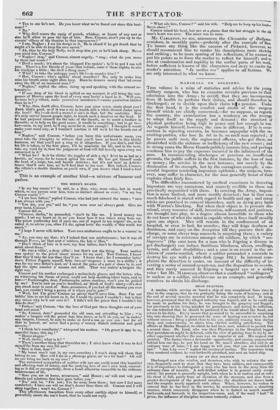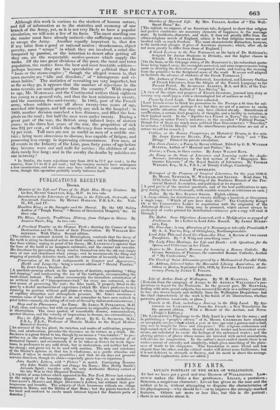MARSHALL ON SOLDIERS.
THIS volume is a mine of statistics and advice for the young military surgeon, who has to examine recruits previous to their
admission into the Army ; to certify that they are incompetent from ill health to perform their duties, and should therefore be discharged; or to decide upon their claim to a pension. Under the first head, it is the comfort and credit of the surgeon himself which are chiefly concerned,—for we suppose, as regards the country, the examination has a tendency on the average to adapt itself to the supply and demand ; the standard of physical perfection being high in peace and low enough in war. As regards himself, however, the case is different. If' he is over- curious in rejecting recruits, he becomes unpopular with the re- cruiting-parties, who lose 2s. litt. to 3s. on each man rejected ; if he passes unfit men, the regimental officers, who get them, are dissatisfied with the sickness or inefficiency of the new collier ; and in strong cases the Horse Guards publicly censure him, and perhaps condemn him to pay the expenses incurred in the inlistment of the man. In recommending discharges or pensions on insufficient grounds, the public suffers in the first instance, by the loss of men or money ; the service in the next instance, not merely by the diminution of its strength, but by the contagious example, a sue- cessful impostor rendering imposture epidemic ; the surgeon, how- ever, may suffer in character, for the men generally boast of their exploits when fairly free. The difficulties encountered by medical examiners in detecting imposture are very numerous, and scarcely credible to those not practically acquainted with them. In entering the Army, imposi- tion is more limited, and more readily detected; but in that case •
much fillsehood is stated with regard to health and age ; and many tricks are practised to conceal blemishes, such as dying grey hairs with Warren's blacking. But when their object is to procure dis- missal, every resource of skill, invention, self-control, and patience, are brought into play, to a degree almost incredible to those who do not know of what the mind is capable when it fixes itself steadily upon one object. Men will remain in the confinement of an hospital, or even in bed, for months ; they will feign deafness or dumbness, and carry on the deception till they procure their dis- charge, or some clever trap succeeds in surprising them ; a variety of' receipts are in existence amongst old soldiers, by which " ma- lingerers" (the cant term for a man who is feigning a disease to ;••
get discharged) can induce factitious blindness, ulcers, swellings, hernia, and other disabilities ; and a case is on record in the ar- chives of courts-martial, where a soldier persuaded a comrade to destroy his eye with a table-fork (page 102.) In internal com- plaints the detection is easier, on account of the difficulty of in- venting a series of natural symptoms, and the disposition to overdo, and they rarely succeed in feigning a languid eye or a sickly voice : but Mr. MArtstram. observes that a confirmed " malingerer is useless as a soldier, mischievous as an example, and generally contrives to obtain his discharge.
SHAM DEAFNESS.
A marine, while serving on board a ship of war, complained from time to time to the surgeon, that he was gradually losing the sense of hearing; and at the end of several mouths asserted that he was completely deaf. It being, however, presumed that the alleged infirmity was feigned, and as lie could not be made to perform his duty, he was brought to the gangway and flogged; but previously to his being paraded for punishment, and during its infliction, he was informed that he should be pardoned if he would admit the fraud, and return to his duty. Every means that promised to be successful in surprising him into showing that lie possessed the sense of hearing was resorted to, but without success : tiring a pistol close to his ear, suddenly rousing him during sleep, and endeavouring to alarm him, elicited nothing satistlictory. The officers at Hasler Hospital, to which he had been sent, resolved to punish hint a second time. Dr. Lind, who was then Physician to the Hospital, begged that punislunent might be deferred, with the view of gaining time to try by an- other experiment whether the man was an impostor or not. His request was granted. The doctor chose a favourable opportunity, and coining unperceived behind him one day, lie put his hand on the man's shoulder, and said in an ordinary tone of voice, " I am happy to tell you, that you are invalided at last," " Am I, by —!" replied the overjoyed marine. The imposture being thus rendered evident, he was forthwith punished, and sent on board ship.
MARKS OF AN OLD SOLDIER.
Discharged men who reinlist, and deserters, who wish to reenter the ser- vice, frequently omit to state that they have been soldiers, and consequently it is of importance to distinguish a man who has been in the army front the ordinary class of recruits. A well-drilled soldier is in general easily recog- nized: his posture is generally upright, both when he is in motion and at rest ; his chest is full, partly from an elevation of the sternum, and also from a greater development of the pectoral muscles ; the shoulders are drawn back, and the scapulae nearly approach each other. When, however, he wishes to conceal that he has been in the service, he sometimes assumes a slouching manner, which connnonly disappears when he is desired to march smartly backwards and forwards in the inspection-room, and, if the word " halt" be given, the influence of discipline becomes instantly evident. Although this work is curious to the student of human nature, and full of information as to the statistics and economy of one branch of the Army, yet, as it is not very likely to have a popular circulation, we will note a few of its facts. The most startling one the reader must have already noticed—the sufferings men endure to escape the Army. Another equally important is, that *w if any inlist from a good or rational motive : drunkenness, abject poverty, some " scrape" in which they arc involved, a mind dis- tempered by passion, or the intention to desert after getting all they can, are the respectable motive-powers which supply the ranks. Of the two great divisions of the poor, the rural and town population, the rustics form the best and most tractable soldiers— perhaps because they are less speculative or political than the " loom or the steam-engine ; " though the alleged reason is, that town recruits are " idle and dissolute," of " intemperate and vi- cious habits." The statistics of recruiting are very imperfect, but so far as they go, it appears that the number of rejections in the town recruits are much greater than the country.* With respect to age, Mr. :NIARSIIALL and the Continental writers think eighteen too young as a general rule, and that the best minimum is twenty, and the maximum five-and-twenty. In 1805, part of the French army, whose soldiers were 'all above twenty-two years of age, marched 400 leagues, and left scarcely any sick in the hospital : in 1809, another division marched a less distance, and filled the hos- pitals on the road ; but half the men were under twenty. During a great part of the war, the British army inlisted boys of sixteen years : in the three last years of the war, the proportion of sick was 221 per cent., of which the inefficiency from wounds was only 14- per cent. Tall men are not so useful as men of a middle sta- ture; being more obnoxious to disease, less capable of fittigue, and possessing less energy in depressing circumstances. Few men, at all events in the Inffintry of the Line, pass forty years of age before they become worn out and unfit for service : the children of sol- diers rarely live long; and in the cavalry the deaths by suicides are one in twenty !
In Dublin, the town rejections vary from 28.6 to 711 per cent.; in the country, from rrl to 27.2 per cent. ; but the country recruits have undergone a first examination, and town men may have inlisted in the country, or vice versa, though this operation probably nearly balances itself.



























 Previous page
Previous page